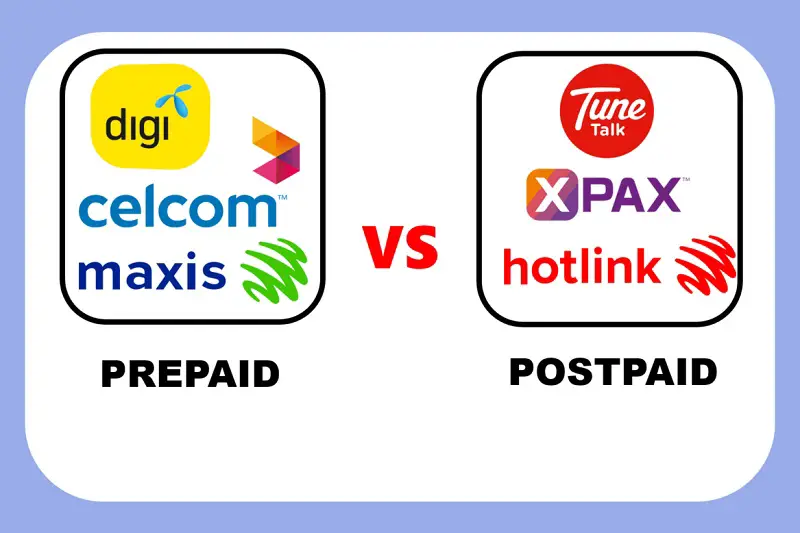Are postpaid plans still relevant in Malaysia as of 2023? We all know prepaid plans are much cheaper than postpaid plans in Malaysia. But are there other benefits to using postpaid?
For those new to Malaysian mobile plans, here is an introduction to prepaid and postpaid plans.
Table of Contents
ToggleWhat are prepaid plans and postpaid plans
Prepaid plans mean users need to pay upfront for the mobile plan before they can start using services such as calls, SMS, and mobile data. And most importantly, there’s no contract.
Postpaid plans mean users will receive bills on a month-to-month basis. Postpaid is usually bound by a contract between 12 to 24 months in Malaysia. If users exceed the call, SMS or data limit, the services will continue but excess charges will incur.
Prepaid plans vs postpaid plans
Prepaid and postpaid plans have their respective pros and cons. Let’s quickly check out the differences between them.
| Prepaid | Postpaid | |
| Price | Cheap | Expensive |
| Contract | No | Yes |
| Service interruption for overage | Yes | No |
| SST | Exempted | 6% |
| Penalty for early termination | No | Yes |
| Flexible | Yes | No |
| Port to other telcos | Easy | Difficult |
| Speed | Varies depending on subscribed plan | Usually unlimited |
| Coverage | Equal | Equal |
| Family lines | No | Yes |
| Smartphone bundles | No | Yes |
| Most suitable for | Individual user | Corporate User |
Best mobile plans deal on Lazada Best mobile plans deal on Shopee
Top 5 reasons prepaid plans better than postpaid plans
#1 Prepaid plan is cheaper than postpaid plan
Generally, prepaid plans are cheaper than postpaid plans in Malaysia.
As of 2023, the median price of prepaid plans in Malaysia is only RM37.06, which equals RM1.20+ per day.
Almost anyone can afford this price range and enjoy unlimited internet, with or without a speed limit, depending on the telcos.
For example, Umobile U25 is only RM25 per month with 3Mbps speed limit. It is sufficient for web browsing and watching videos with 480p quality on a phone.
On the other hand, mobile postpaid plans have a median price of RM113.91, calculated based on the latest postpaid plans offered by Celcom, Maxis and Digi on January 2023. It is almost 3 times the median price of postpaid plans.
Additionally, prepaid reloads are exempt from 6% Service Tax for Malaysians under Section 34(3)(a), but postpaid plans will be charged an additional 6% Service Tax (SST).
Furthermore, you can reload via the Lazada and Shopee apps, which gives you a discount of nearly 5%-10%. And possibly, you could earn some cashback or coin cashback.
#2 No contract
The second biggest benefit of using a prepaid plan is no contract period. Users are not bound to any contract and free to upgrade or downgrade their plans each month.
And there’s no fixed monthly commitment to worry about.
As an example, if you are taking a long holiday trip overseas, you can just hold off on your prepaid plan. Typically, your number will remain active for another 30 to 60 days.
#3 No surprise charges
With prepaid plans, there are zero surprise charges. Users must subscribe to a plan before they can access calls or data services. Furthermore, your available credit will be deducted immediately if you use additional call time or SMS. So, it is very clear cut.
There are many postpaid customers who accidentally consume more data and call time than their plans allow. Worse yet, they don’t realize this until they receive the phone bills and suffer financial losses.
#4 Easy to switch telco/port out
In prepaid plans, porting out or switching to another telco is easier. Most of the time, the entire process can be done online.
In contrast, postpaid plans are typically more difficult to switch or even terminate. First, you must fulfil the contract period to avoid getting penalized. It is usually necessary for the user to make a phone call or to visit the nearest customer service centre in order to complete the port-out process.
#5 No Late fees
The prepaid plans are pay-as-you-go. If you don’t pay upfront, you don’t get the service, that’s all. You won’t have to worry about late fees.
For postpaid plans, there is a payment due date for every month’s bill. You will be charged a late payment fee if you forget to pay. For example, Maxis may charge late payment interest of 1.5% per month on such overdue amounts.
3 Advantages of postpaid over prepaid plans
#1 No service interruption
Compared to prepaid plans, the biggest advantage of postpaid plans is that you won’t have to worry about your service being cut off even if you exceed the limit of your plan. But it comes with overage charges.
You have consistent services, which is good. A very important aspect for corporate and business users
#2 Family lines
There are special postpaid family plans offered by Celcom, Maxis and Digi. In some cases, there are good family plans that are more cost-effective than each person subscribing to an individual prepaid plan.
#3 Smartphone bundles
Those looking for a cheaper smartphone, especially an iPhone, can consider subscribing to postpaid plans bundle with a smartphone. However, it is important to do some research and compare various iPhone plans before choosing the most suitable one.
Verdict
In conclusion, prepaid plans are better for individual users since they are cheaper and there is no contract.
Conversely, postpaid plans are better for businesses because there is no interruption of service when you exceed your limit, and the bills are better for accounting purposes.

